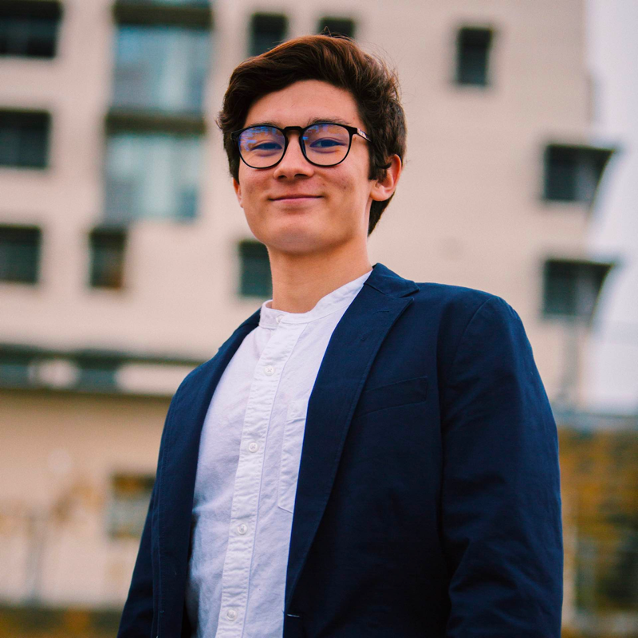When Henry Asker (NCHS ‘18) was in high school he, like many other high school students, ran on the varsity track team, volunteered with the SLOBS, and enjoyed math and science. Henry was fairly confident that his college and career trajectory would take him into the mathematical or scientific world. But, as a high school junior, he wasn’t sure exactly what path he would take.
He was sure of one thing, though. Henry knew that he wanted to pursue a profession that would allow him to enact positive change and create societal impact. Reflecting on this, Henry told me that his parents had a big influence on this perspective. His parents encouraged him to think not about the material benefits of different career tracks, but rather the ability to look back on what you’ve accomplished and the difference you’ve made. Henry told me, “We’re all trying to find purpose,” and it became apparent to me through our conversation that Henry derives purpose through his ability to help others. This drive takes form in Henry’s life through acts such as helping younger students build turbines, and by inspiring his peers with his photography and videography talents.
A Turning Point
A lecture at Columbia University in 2017 changed Henry’s trajectory. When Henry heard a lecturer at an Engineering Immersion Program speak about the potential that hydrogen fuel cell technology has to create energy without the harmful byproducts, he began to think about a future in chemical engineering and renewable energy. Henry shared with me some the inspiration that influenced him: his chemistry teacher, who doubled as his track coach, as well as positive peer pressure from a bright and talented group of friends pushed him to take on the challenge of chemical engineering. Now, Henry is a senior studying Chemical Engineering at The University of California, San Diego (UCSD).
Carbon Sequestration Experience
Henry has been up to some pretty impressive things since starting at UCSD, starting with an internship at a renewal start-up Carbonvert. His face lit up as he explained how carbon sequestration works and the way carbon captured through these processes can be reused to carbonate drinks or be sold as carbon credits. Because Carbonvert is a startup, Henry enjoyed a wide range of responsibilities to take on initiatives, run with ideas, work on project development, and model business costs. Henry described the proud moment when Carbonvert received their first official deal…This, shared Henry, is when it all started to feel “real” for him.
Creating Wind Turbines on Campus
As a senior, Henry stepped into a leadership position within the UCSD chapter of the American Institute for Chemical Engineers (AIChE). He is the project manager for the on-campus Portable Wind Turbine project, where he directs a group of undergraduate students in the process of developing turbines. The turbines’ goal is to give some relief to UCSD students who need to charge their laptops and phones while taking courses in the temporary outdoor classrooms that the university instituted in response to Covid.
Henry has described this undertaking as a project “inside and out”: meaning that while it is a literal project for his AIChE chapter, it has also been a transformative experience for him. When he stepped in as the project manager, Henry found himself needing to engage a range of soft skills to help drive the project along. Tasks that include dealing with grants requests, running a team of undergrads, reporting to an external board, and representing AIChE to the university have strengthened his communication and people skills. As a result, he had learned the utmost importance of understanding people’s wants and needs. Meanwhile, the engineering aspects of the wind turbine project continue to challenge his technical skills. In line with Henry’s deep-seated desire to create a positive impact for those around him, one of the most rewarding aspects has been the ability to mentor younger engineering students – from how to use laser cutters to introducing engineering software that they will need in advanced coursework.
So…What’s Next?
I asked Henry every college senior’s absolute least favorite question… What’s next?
Given his passion for engineering and the positive experiences he has had as a project leader, he is looking to continue his career in the renewable energy industry. Henry is considering returning to school for a master’s degree in Business Management or Engineering Management.
As our conversation came to a close, Henry shared some last thoughts for other students who might be interested in pursuing a trajectory similar to his. First, no – there are no shortcuts. The schoolwork is demanding and challenging. But he also shared that an unwavering belief in himself and dedication to his goals are the two things that helped him through challenging times.


Bravo to this young man who is making choices that will not only benefit others but will give him
great satisfaction knowing he has made a positive impact on our earth and society.
We need more young people like him.
I like this story — it’s informative, it’s positive, and I believe it’s inspiring.
I have known Henry since he was 6 years old and I always knew he would be the kind of person to make a real difference in this world. His parents have always been in tune to the environmental issues we face. We, as parents, must set an example every day. Young men like Henry are the positive results of those efforts.
It is wonderful to see how a young New Cannanite is working towards making a difference in reducing our carbon footprint. Bravo Henry! Please give me a ring when you next come back to New Canaan as I would be delighted to give you some counsel on careers in energy and resource sustainability.
Skip Hobbs
Geologist, Farmer and Conservationist